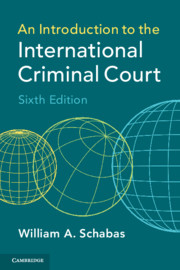Book contents
- An Introduction to the International Criminal Court
- An Introduction to the International Criminal Court
- Copyright page
- Contents
- Preface
- Abbreviations
- 1 Creation of the Court
- 2 The Court Becomes Operational
- 3 Jurisdiction
- 4 Triggering the Jurisdiction
- 5 Admissibility
- 6 General Principles of Criminal Law
- 7 Investigation and Pre-Trial Procedure
- 8 Trial and Appeal
- 9 Punishment
- 10 Victims of Crimes and Their Concerns
- 11 Structure and Administration of the Court
- Appendices
- Bibliography
- Index
8 - Trial and Appeal
Published online by Cambridge University Press: 09 June 2020
- An Introduction to the International Criminal Court
- An Introduction to the International Criminal Court
- Copyright page
- Contents
- Preface
- Abbreviations
- 1 Creation of the Court
- 2 The Court Becomes Operational
- 3 Jurisdiction
- 4 Triggering the Jurisdiction
- 5 Admissibility
- 6 General Principles of Criminal Law
- 7 Investigation and Pre-Trial Procedure
- 8 Trial and Appeal
- 9 Punishment
- 10 Victims of Crimes and Their Concerns
- 11 Structure and Administration of the Court
- Appendices
- Bibliography
- Index
Summary
The procedural regime of the International Criminal Court is largely a hybrid of two systems, the adversarial approach of the English common law and the inquisitorial approach of the Napoleonic code and other European legislations of the Romano-Germanic tradition. The trial procedure is not specified in detail in the Statute or in the Rules, and a large degree of latitude to the judges in this respect. The trial is to take place at the seat of the Court, in The Hague, unless otherwise decided. In absentia trial is explicitly prohibited although the accused may be absent for part of the proceedings in certain circumstances. Subject to exceptions, the trial is public. Detailed procedural guarantees for the defence are set out, including a robust provision on the presumption of innocence. When the prosecution has finished presenting its evidence, the Trial Chamber may allow a ‘no case to answer’ motion. Special rules apply if the defendant chooses to plead guilty. Regulation 55 allows the judges to reformulate the charges while the trial is underway. When the trial is completed, the Trial Chamber may issue a decision convicting the accused if it is convinced of guilt beyond a reasonable doubt. Subsequent stages require the Trial Chamber to fix the sentence and then rule on reparations for victims. There is an unqualified right of appeal from the final verdict as well as appeals with permission of the Trial Chamber of decisions issued in the course of the trial, for example on matters of procedure and evidence.
- Type
- Chapter
- Information
- An Introduction to the International Criminal Court , pp. 301 - 337Publisher: Cambridge University PressPrint publication year: 2020

